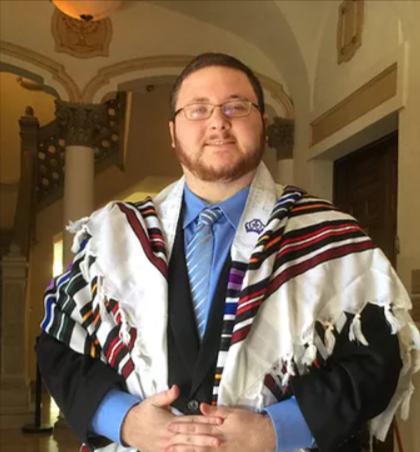For Rabbi Samuel Stern, the idea of becoming a rabbi first crossed his mind while his own rabbi was helping him learn for his bar mitzvah.
“That involved not just learning trope and learning how to chant my portion, but also conversations about what it meant to be a Jew,” Rabbi Stern said. “That kind of bar mitzvah preparation, for me, really solidified some things in my own mind…that’s when I thought, ‘This is really what I’d like to do.’”
He was ordained this past May and moved to Topeka to start his position at Temple Beth Sholom at the beginning of July. He is now the rabbi of the only synagogue in Topeka, a Reform synagogue that’s more than 100 years old.
He is the successor to Rabbi Moti Rieber, who served as interim after the departure of Rabbi Debbie Stiel last year.
Rabbi Stern grew up outside of Washington, D.C., in suburban Rockville, Maryland. His family was active at a local Reform congregation where he participated in youth groups and camps.
He attended Towson University in Towson, Maryland, where he was active in its Hillel. He earned a master’s degree in Jewish communal service and worked in the field of synagogue life. After a few years, he felt ready to pursue becoming a rabbi.
Rabbi Stern attended the Hebrew Union College-Jewish Institute of Religion, a Jewish seminary for training clergy in the Reform movement. As part of his schooling, he served congregations in Ogden, Utah; San Antonio, Texas; and the Hillel of the University of Southern California.
In a June 2020 Chronicle article about her departure, Rabbi Stiel, who served at Temple Beth Sholom for 14 years, said she would like people to know that Topeka is a great place to live. She encouraged people to consider moving there if they were looking for a city that’s smaller, yet still has the arts and a warm congregation.
Rabbi Stern is experiencing Rabbi Stiel’s description of the Topeka community exactly. He said the Jewish community of Topeka has been helpful in his first few months.
“People seem interested in my and my wife’s wellbeing,” he said, “and that’s nice because we moved to a place where we didn’t know anybody or have family that lives within a thousand miles of here. Every relationship is new, and that can be hard and stressful when people locate. I never underestimate the importance of people’s kindness. As trite as it may sound, my favorite thing is that they are very kind.”
Rabbi Stern said he is pleased the Topeka Jewish community wants to have a strong connection with their tradition, religious life and rabbi.
“[The community] takes its role as the only synagogue and only Jewish presence in the capital of the state of Kansas very seriously,” he said.
He is thankful to Temple Beth Sholom for being “welcoming and open and willing to take a chance on a newly ordained rabbi.”
Unfortunately, Rabbi Stern’s first few months at Temple Beth Sholom have occurred during the pandemic. With the rise of the Delta variant of COVID-19, Temple Beth Sholom’s High Holiday services were held online, and Rabbi Stern hasn’t experienced many in-person services with his congregation inside the synagogue (a Sukkot service was held outside in person). Not being able to see people in person and not having people drop by the synagogue have been a struggle for Rabbi Stern.
“Now we’re making steps again to reopen and, be’ezrach Hashem, be open again for services and meetings and Torah study in the building,” he said. “[The pandemic] makes it harder to meet congregants – it makes everything harder.”
As for the future of Temple Beth Sholom, the short-term mission is strategic planning. Rabbi Stern and the synagogue aim for growth of the religious school, an adult education series, and building ties with the smaller, less equipped Jewish communities in more rural areas of Kansas.
“There are smaller communities that might not have a building,” he said. “None of them have rabbis out here except for [Topeka]. We want to be building those ties – it’s important to help serve more Jews across northeast Kansas.”
While Rabbi Stern is passionate about giving sermons and writing about Judaism and Jewish topics, his favorite aspect of being a rabbi is working with people during important life-cycle moments.
“I get the first opportunity to be there for people,” Stern said. “I am the person that is called when somebody passes away. I meet with couples before they go to chuppah to get married. I work with b’nai mitzvah students. I get to be there for people because I am who so many of my congregants go to in major moments.”
Teaching is another priority for Rabbi Stern. In addition to teaching Torah, he finds helping people make choices about their relationship to mitzvot “incredibly important.”
In his personal statement, he wrote that his mission “is to open the toolbox of mitzvot, so Jewish people can live lives that are Jewish, ethical and moral…I want to work with people to pay attention to their actions, to be thoughtful about their practice of mitzvot, and to always strive to increase in holiness through mitzvot for themselves, their families, and their Jewish community.”
As for “extracurriculars” outside of being a rabbi, Rabbi Stern likes to smoke brisket – “A nice twist on the classic Jewish brisket” – to help augment holiday meals. He enjoys playing with his two dogs, reading, and going to farmers markets with his wife, Caryn.
By Sam Kricsfeld,
Editor



